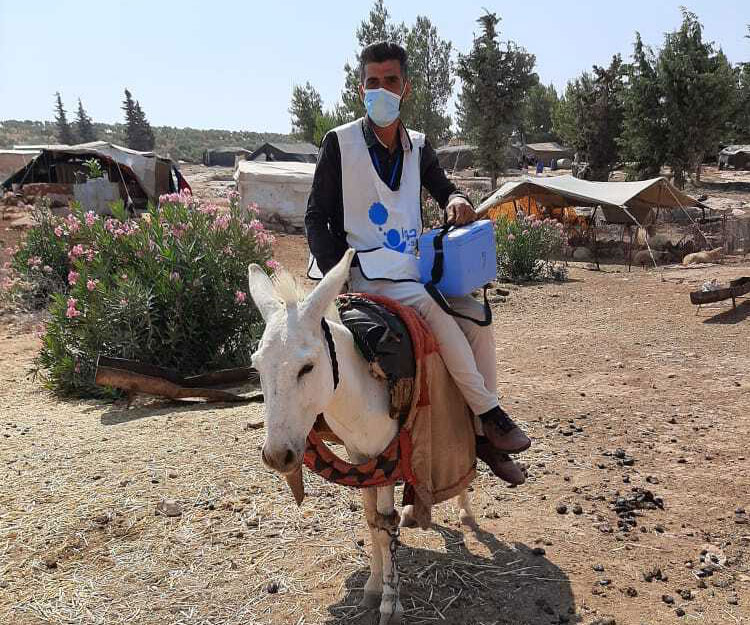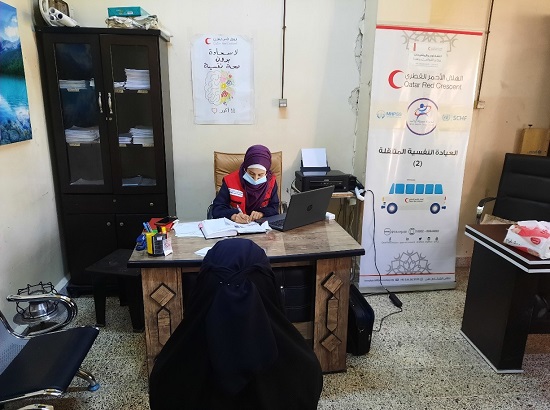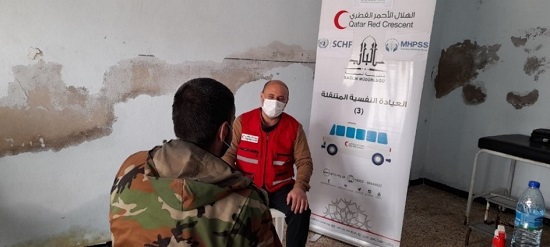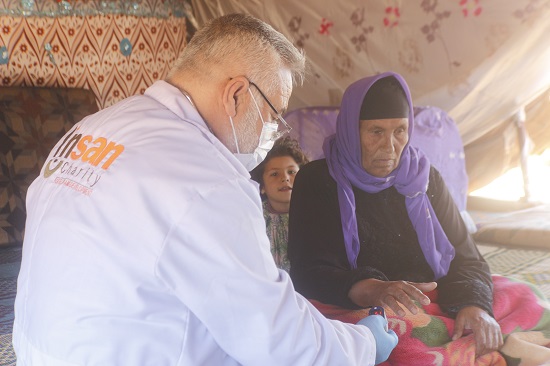انتهاء حملتنا الناجحة للتطعيم ضد شلل الأطفال في شمال غرب سوريا هذا الصيف

7 أيلول/ سبتمبر 2021، حققت الحملة التي قادتها منظمة الصحة العالمية واليونيسف في 44 مركزًا للدعم الجماعي إنجازًا استثنائيًّا بهدفها الهائل المتمثل في تطعيم 815242 طفلًا دون الخامسة من العمر ضد شلل الأطفال في جميع أنحاء المنطقة التي مزقتها الحرب. فشلل الأطفال، كما قد تعلمون جيدًا، لا يزال فيروسًا نشطًا في عالمنا، يمكنه أن يصيب ضحاياه، أيًا كانت أعمارهم، بالشلل مدى الحياة، ولكن فور حصولك على التطعيم كاملًا، يزودك بوقاية من هذا المرض المروع طوال العمر.
ومع ذلك، بقيت منطقة واحدة لم يتسنَّ أن تكون جزءًا من الحملة الأولية للتمنيع. وبعد أسابيع من المفاوضات الدقيقة والحساسة، تمكنت منظمة الصحة العالمية وشركاؤها وفريق لقاح سوريا من دخول منطقة عفرين وتطعيم 87466 طفلًا إضافيًّا هناك. ونحن فخورون للغاية بهذا التفاني والعمل، ويسعدنا أن نخبركم بأن المنظمة وفريق لقاح سوريا حققا معًا نسبة مذهلة بلغت 106% من التطعيمات المستهدفة.
وهذه صورة لأحد الأعضاء المتفانين من فريق لقاح سوريا على ظهر حمار أثناء توصيل لقاح شلل الأطفال المحتفظ به في سلسلة التبريد، محاولًا الوصول إلى الطرق الوعرة البعيدة في منطقة عفرين. فكل طفل يستحق أن يكون له الحق في الصحة، ولا تكفل منظمة الصحة العالمية وشركاؤها الوفاء بالحصص فحسب، بل يكفلون أيضًا إنقاذ الأرواح وتغييرها للأفضل.
ويسعدنا أن نتوجه بالشكر والامتنان للدكتور لطفي (بمنظمة الصحة العالمية) وللدكتور ياسر (بفريق لقاح سوريا) على تفانيهما والتزامهما بإنقاذ الأرواح في شمال غرب سوريا.
للمزيد من المعلومات، يُرجى التواصل مع:
جراتان لينش، المسؤولة الإعلامية
البريد الإلكتروني:
منظمة الصحة العالمية تتصدى للزيادة المفاجئة في فيروس دلتا بأكبر شحنة يُسلمها مرفق كوفاكس حتى الآن لشمال غرب سوريا
6 أيلول/ سبتمبر 2021 - مع ارتفاع حالات الإصابة بمرض كوفيد-19، وبذل المستشفيات محاولات مضنية للتعامل مع المرض في أنحاء سوريا التي مزقتها الحرب، كانت هناك حاجة ملحة لتسريع وتيرة برنامج التطعيم. فسلم مكتب منظمة الصحة العالمية القُُطري في تركيا، في نهاية هذا الأسبوع، أكثر من 358 ألف جرعة عبر الحدود إلى شمال غرب سوريا. ويسر منظمة الصحة العالمية أن تعلن أن هذه الشحنة هي أكبر شحنة لقاحات يُسلِّمها مرفق كوفاكس لشمال غرب سوريا حتى الآن.

فقد ارتفع معدل الإصابات بمرض كوفيد-19 في شمال غرب سوريا منذ أوائل آب/ أغسطس، بعد زيادة الحركة عبر الحدود عقب عطلة العيد. كذلك، تسببت حركة الناس في انتقال مختلف التحوُّرات المثيرة للقلق. فارتفع عدد حالات الإصابة اليومية إلى أكثر من 1000 حالة إصابة جديدة في اليوم خلال الأسبوع الأخير من شهر آب/ أغسطس الجاري. وهناك أيضًا تقارير تفيد بوجود زيادة في بعض مخيمات النازحين داخليًّا تمثل أكثر من 200%، أضف إلى ذلك ما يثيره انتشار التحور دلتا من قلق بالغ.

وفي نهاية هذا الأسبوع، في معبر باب الهوى الحدودي، تلقى شركاء منظمة الصحة العالمية، اليونيسيف وفريق لقاح سوريا، شحنة جاءت في موعدها تمامًا بلغت 358 ألف جرعة من مرفق كوفاكس، كان من المتوقع وصولها في 10 أيلول/ سبتمبر، ولكن، نظرًا للظروف الملحة والعاجلة، طلبت المنظمة من التحالف العالمي من أجل اللقاحات والتمنيع التعجيل بعملية الشحن. فوصلت هذه الدفعة الثالثة من مرفق كوفاكس إلى مطار أضنة في تركيا في 1 أيلول/ سبتمبر، وعبرت إلى شمال غرب سوريا في 3 أيلول/ سبتمبر. ويعمل فريق عمل المنظمة المعني بكوفيد يوميًّا مع شركائنا في سوريا للتصدي لحالات الإصابة بكوفيد-19، ونرصد معًا بدء تنفيذ برنامج التطعيم الجاري. منظمة الصحة العالمية - إنقاذ الأرواح في شمال غرب سوريا

للمزيد من المعلومات، يُرجى التواصل مع:
جراتان لينش، المسؤولة الإعلامية
البريد الإلكتروني:
Improving lives in northwest Syria with support from ECHO
1 August 2021 – Each month we present some human interest stories about people whose lives have been changed thanks to the generous and continuous support of the European Civil Protection and Humanitarian Aid Operations (ECHO) and the relentless dedication of our partners on the ground in northwest Syria.
The story of Um Khaled and her experience with depression disorder
Um Khaled is 42 years old and was displaced from the Damascus countryside to Idlib. She has been divorced for a long time and her daughter lives far from her and her other child has been living with his father since the divorce. She is currently living alone in her friend's house without any privacy, far from all her family members who all live in and near Damascus. She has no relatives in Idlib and was displaced there due to the conflict.

For more than 7 months, Um Khaled had suffered from symptoms of chest tightness, headaches, sleep disturbance, and a lack of interest in daily activities. Also, her bad financial status increased the severity of her symptoms and she was always crying and generally in a heightened state of depression. One day, she took action to visit the mobile clinic run by the Qatar Red Crescent Society and supported by WHO through the ECHO fund.
At the centre, the psychosocial worker developed a comprehensive approach and established an appropriate care plan for Um Khaled to reduce the severity of her client’s psychological symptoms and provide psychosocial support to improve overall well-being and resilience. The psychosocial worker implemented interventions to achieve these goals that focused on providing psychoeducation to her client about depression, its symptoms and how to deal with them. She also communicated with the client’s friend and her family (the only trusted people in displacement) and engage them in the psychosocial support programme and referred her to a women's centre to help her engage in the programme and empowerment activities.
Due to the ECHO fund that enabled WHO to support the mobile clinic, the life of Um Khaled has dramatically improved and her outlook on life has become more positive and focused. Um Khaled’s depressive symptoms were reduced after she received mental health and pyschosocial interventions and her social status improved. Also her friend succeeded in resolving the marital dispute between her and her husband as she has since been granted access to see her young child. We are also very happy to report that she has become a seamstress after engaging in empowerment activities in the women's centre and is now able to work and support herself.
The story of Abdullah and his experience with psychosis disorder
Abdullah is 37 years old has been separated from his wife for the past 4 years due to a worsening psychological condition. He lives in the Aleppo countryside with his widowed mother and his married brother, who has 3 children and they live in a very basic house that is not really inhabitable.
After his separation from his wife, he started to experience strange symptoms and behaviours. He became afraid of many things, sometimes even the sound of people's voices, and a state of nervousness, panic, anxiety and tension overcame him. He started to isolate himself so he quit his job and he refused to leave his house. As a result, his economic situation declined and his problems multiplied. The severity of his condition and symptoms worsened. He began to suffer from auditory and visual hallucinations and started clinging to false beliefs and delusions. He slowly became addicted to captagon pills.
Abdullah’s mother heard of the mobile mental health clinic in their place of residence, so she visited the clinic asking for assistance. The psychosocial worker developed a comprehensive approach and established an appropriate care plan to reduce the severity of his psychological disorder and provide psychosocial support for the other family members. Abdullah was referred to the mental health hospital in Azaz because of the severity of his disorder
The psychosocial worker implemented interventions to provide psychoeducation for the client's family (mother and older brother) about the psychological disorder and the client’s needs during the period ahead. He also set about providing psychological support to the mother to deal with her symptoms of distress that included severe crying and fatigue and referred the family to a organization which provides shelter services to improve the conditions of people's houses. Also, the psychosocial worker referred the children of the older brother to an organization that provides child protection services because risks were identified among the children.

The effect of such treatment was astounding and has changed the life of Abdullah and his whole family and within a month in Azaz hospital his psychotic symptoms were greatly reduced. His health improved as too did the health and psychological status of his mother. The house that they lived in underwent improvements with support from the organization. The children of his brother too have benefited and are now all safe and functional and back at school.
Due to the ECHO funds that enabled WHO to support this mobile clinic, the life of Abdullah and his immediate family have become more hopeful and he is slowly regaining calmness and serenity. Abdullah’s case was one of the more extreme cases of mental health disorder and we are very pleased to announce that due to ECHO’s continual support to WHO and this mobile clinic, both he and his family are living in a healthy and happy home, with bright visions of the future.
WHO’s partner in northwest Syria, INSAN, increases access to life-sustaining health services
1 August 2021 – With the kind support of the European Civil Protection and Humanitarian Aid Operations (ECHO) WHO was able to continue to support INSAN that means ‘human’ in Arabic. INSAN, is a non-profit organization that offers psychosocial support to Syrian refugees, plus training to those working in refugee camps. It was set up by a group of psychologists back in 2012. We cannot stress how important the work of INSAN is on the ground and to the people most in need across northwest Syria.
With ECHO funding INSAN was able to operate from mobile clinics supported by WHO through war-torn northwest Syria to dramatically increase access to those that need life-saving and life-sustaining, coordinated, equitable health services. One such story is that of Um Muhammad in 2021.
Um Mohammad's story

Um Muhammad is a 71 year old woman who was displaced from eastern Almaara 3 years ago and moved to the Al-Jeb camp in Maaret Tamasrin. As an elderly lady she suffers from health problems that include joint and bone pain, in addition to high blood pressure.
One day as the INSAN mobile clinic was passing, her son brought her to be examined by a doctor. The doctor checked her and measured her blood pressure which he found high, so he immediately gave her medicine to reduce it. The doctor also referred her to specialized hospital in order to receive cardiac consultation. After several days, the nurse of the mobile clinic visited Um Muhammad in her tent to follow up on her case and to check her pressure again and make sure that she had recovered. This is the level of medical services and respect that all people deserve, especially the elderly. WHO would like to thank ECHO for their generous and continuing support of INSAN.
Um Ahmad's story
Um Ahmad was displaced from her home so many times across the Aleppo governorate to eventually Idleb where she has finally settled down in Allyth Camp in Haranbush. Now she has twins aged 6 months old. When the INSAN mobile clinic was in the camp she came to the clinic to have her children screened in its nutrition clinic. Community health workers screened the 2 children using the mid-upper arm circumference method and discovered that they both suffered from malnutrition. They instantly provided curative nutrition supplies and dietary instructions to be followed by their mother. They also set a follow-up date to return to the clinic to monitor both children until they had fully recovered. All people deserve this level of treatment and care, and particularly the most vulnerable, such as mothers and young children. WHO would like to thank ECHO for their generous and continuing support of INSAN.
 One of Um Ahmad's twin girls being screened by mid-upper arm circumference
One of Um Ahmad's twin girls being screened by mid-upper arm circumference








